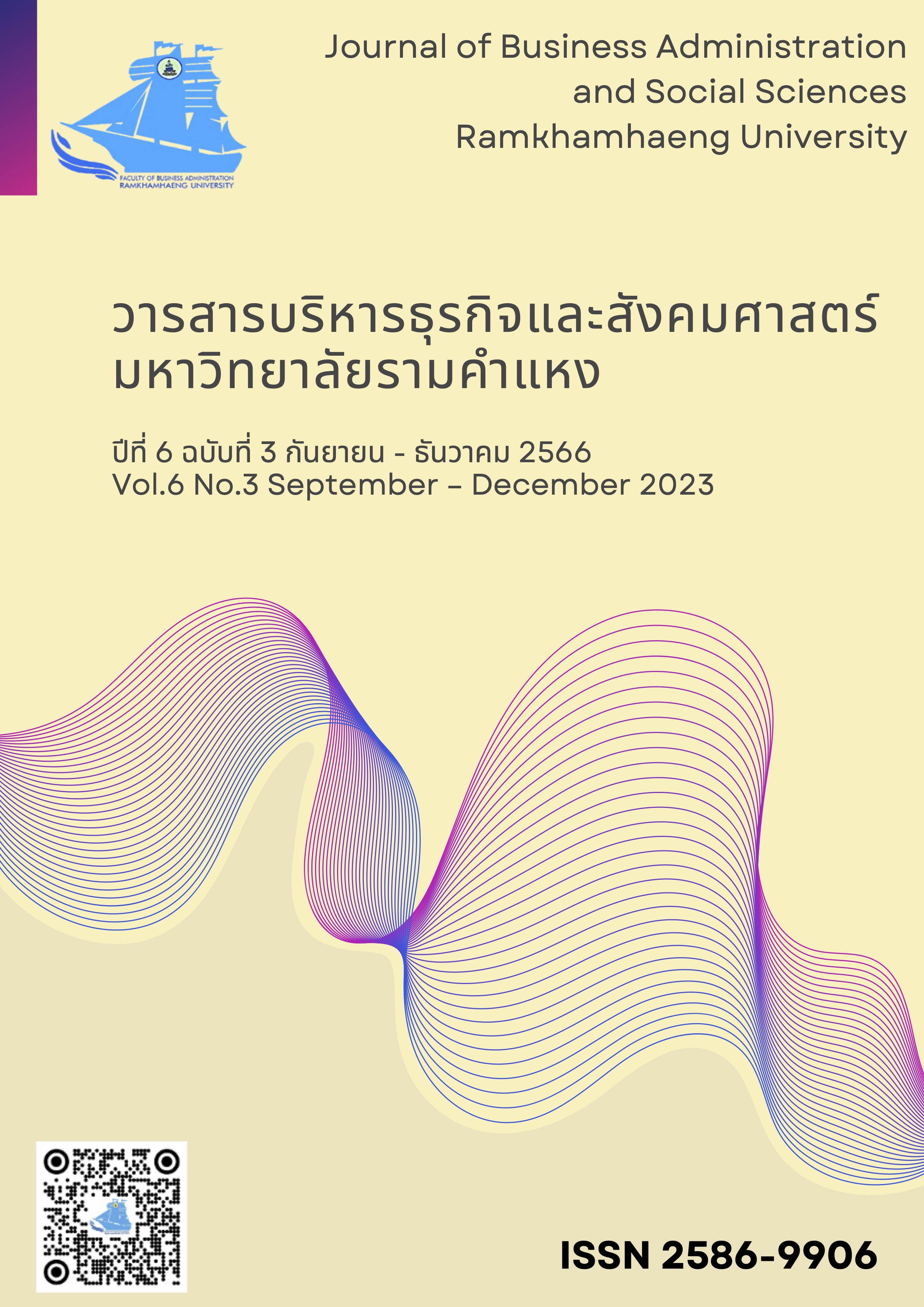Technology Acceptance Factors Affecting the Decisions to Use the Electronic Personal Income Tax Service System of Residents in Bang Khae District, Bangkok Metropolis
Main Article Content
Abstract
In this research investigation, the researchers examine the technology acceptance affecting the decisions to use the electronic personal income tax service system of residents in Bang Khae district, Bangkok Metropolis.
The sample population consisted of 400 residents in Bang Khae district, Bangkok Metropolis using the electronic personal income tax service system. The research instrument was a questionnaire. The statistics used in data analysis were percentage, mean, and standard deviation. The technique of multiple regression analysis was also employed.
Findings showed that the technology acceptance affecting the decisions to use the electronic personal income tax service system of the residents under study was in the following descending order: attitude towards use (ꞵ = 0.356); security perception (ꞵ = 0.281); perceived benefits of use (ꞵ = 0.174; and perceived ease of use (ꞵ = 0.164). They could be explanatory of the decisions to use the electronic personal income tax service system of the residents under investigation with the prediction at 79.30 percent (R Square = 0.793).
Article Details

This work is licensed under a Creative Commons Attribution-NonCommercial-NoDerivatives 4.0 International License.
เนื้อหาและข้อมูลในบทความที่ลงตีพิมพ์ในวารสารบริหารธุรกิจและสังคมศาสตร์ มหาวิทยาลัยรามคำแหง ถือเป็นข้อคิดเห็นและความรับผิดชอบของผู้เขียนบทความโดยตรง ซึ่งกองบรรณาธิการไม่จำเป็นต้องเห็นด้วย หรือร่วมรับผิดชอบใดๆ
บทความ ข้อมูล เนื้อหา รูปภาพ ฯลฯ ที่ได้รับการตีพิมพ์ในวารสารบริหารธุรกิจและสังคมศาสตร์ มหาวิทยาลัยรามคำแหง ถือเป็นลิขสิทธิ์ของวารสารบริหารธุรกิจและสังคมศาสตร์ มหาวิทยาลัยรามคำแหง หากบุคคลหรือหน่วยงานใดต้องการนำบทความทั้งหมดหรือส่วนหนึ่งส่วนใดไปเผยแพร่ต่อ หรือเพื่อกระทำการใดๆ จะต้องได้รับอนุญาตเป็นลายลักษณ์อักษรจากวารสารบริหารธุรกิจและสังคมศาสตร์ มหาวิทยาลัยรามคำแหง ก่อนเท่านั้น
References
กรมสรรพากร. (2566). RD มุ่งสู่องค์กรนวัตกรรมด้วยบริการที่เป็นเลิศ. สืบค้นจาก www.rd.go.th.
พรชนก พลาบูลย์. (2558). การยอมรับนวัตกรรมและเทคโนโลยี การใช้เทคโนโลยี และพฤติกรรมผู้บริโภคที่ส่งผลต่อความตั้งใจของประชาชนในการใช้บริการธุรกรรมทางการเงินผ่านระบบพร้อมเพย์ (Prompt Pay) ของรัฐบาลไทย. การค้นคว้าอิสรบริหารธุรกิจมหาบัณฑิต, บัณฑิตวิทยาลัย มหาวิทยาลัยกรุงเทพ.
พรพิมล พิสูตร และ ชิณโสณ์ วิสิฐนิธิกิจา. (2565). การรับรู้และทัศนคติของประชาชนที่มีผลต่อการตัดสินใจใช้ระบบตลาดแลกเปลี่ยนแปบบไร้ตัวกลาง (Uniswap) ในประเทศไทย. วารสารการบริหารและสังคมศาสตร์ปริทรรศน์, 5(1), 25-38.
ภัททิยา ลือมอญ. (2564). ปัจจัยที่มีผลต่อการตัดสินใจใช้บริการแอปพลิเคชั่น Skyscanner ของกลุ่มนักท่องเที่ยวชาวไทยในเขตกรุงเทพมหานคร. วิทยานิพนธ์บริหารธุรกิจมหาบัณฑิต, มหาวิทยาศิลปากร.
วรินทร เอิบแจ้ง และ ธัญนันท์ บุญอยู่. (2565). ปัจจัยเชิงสาเหตุที่มีผลต่อความตั้งใจใช้บริการนวัตกรรมยื่นแบบแสดงรายการภาษีเงินได้บุคคลธรรมดาผ่านอินเทอร์เน็ตของประชาชนในเขตพื้นที่หนองแขม. วารสารการบริหารนิติบุคคลและนวัตกรรมท้องถิ่น, 8(8), 153-166.
สัญญา เนียนเปรม, วนันพรณ์ ชื่นพิบูลย์, เมชยา ท่าพิมาย, และ กนกวรรณ ศิริแก้ว. (2563). ปัญหาและอุปสรรคในการยื่นแบบแสดงรายการและชำระภาษีผ่านระบบอินเตอร์เน็ตของบุคลากรภายในโครงการชลประทานขอนแก่น. วารสารศิลปศาสตร์และวิทยาการจัดการ, 7(1), 1-14.
สิทธิชัย ภูษาแก้ว. (2560). ปัจจัยการยอมรับเทคโนโลยีที่มีผลต่อการตัดสินใจใช้บริการ Grab ของผู้บริโภคในกรุงเทพมหานคร. การค้นคว้าอิสระบริหารธุรกิจมหาบัณฑิต, มหาวิทยาลัยกรุงเทพ.
สุชารัตน์ บุญอยู่ และ สุมาลี รามนัฏ. (2562). ตัวแบบเชิงสาเหตุของปัจจัยที่มีผลต่อการเลือกใช้เทคโนโลยีทางการเงินของผู้ใช้บริการธนาคารรัฐวิสาหกิจในจังหวัดราชบุรี. วารสารวิจัยมหาวิทยาลัยเวสเทิร์น มนุษยศาสตร์และสังคมศาสตร์, 5(3), 299-314.
อธิชัย ชื่นอารมณ์ และ ธัญนันท์ บุญอยู่. (2563). โมเดลสมการโครงสร้างปัจจัยด้านการรับรู้ที่มีผลต่อพฤติกรรมการใช้ระบบบริหารจัดการคิวอาร์โค้ดของเจ้าหน้าที่โรงพยาบาลเอกชนแห่งหนึ่งในเขตธนบุรี. วารสารรังสิตสารสนเทศ, 26(1), 6-21.
Cochran, W. G. (1977). Sampling techniques. (3rd ed.). New York: John Wiley & Sons.
Cronbach, L. J., & Meehl, P. E. (1955). Construct validity in psychological tests. Psychological Bulletin, 52(4), 281-302.
Fishbein, M., & Ajzen, I. (1975). Belief, attitude, intention, and behavior: An introduction to theory and research. Reading, Mass: Addison-Wesley.
Izkair, A. S., & Lakulu, M. M. (2021). Experience moderator effect on the variables that influence intention to use mobile learning. Bulletin of Electrical Engineering and informatics, 10(5), 2875-2883.
Lai, P. (2017). The literature review of technology adoption models and theories for the novelty technology. Journal of Information Systems and Technology Management, 14(1), 21-38.
Likert, R. A. (1932). A technique for the measurement of attitudes. Archives of Psychology, 140, 5-53.
Mazaheri, E., Richard, M. O., & Laroche, M. (2012). The role of emotions in online consumer behavior: A comparison of search, experience, and credence services. Journal of Service Marketing, 26(7), 535-550.
Moura, I. V., Almeida, L. B., Silva, W. V., Veiga, C. P., & Costa, F. (2020). Predictor factors of intention to use technological resources: A multigroup study about the approach of technology acceptance model. Sage open, 10, 1-17.
Ooi, K. B., & Tan, G. W. H. (2016). Mobile technology acceptance model: An investigation using mobile users to explore smartphone credit card. Journal of Expert Systems with Applications, 59, 33–46.
Wu, Z. T. Z. (2011). A meta-analysis of the impact of trust on technology acceptance model: Investigation of moderating influence of subject and context type. International Journal of Information Management, 31(6), 572-581.


